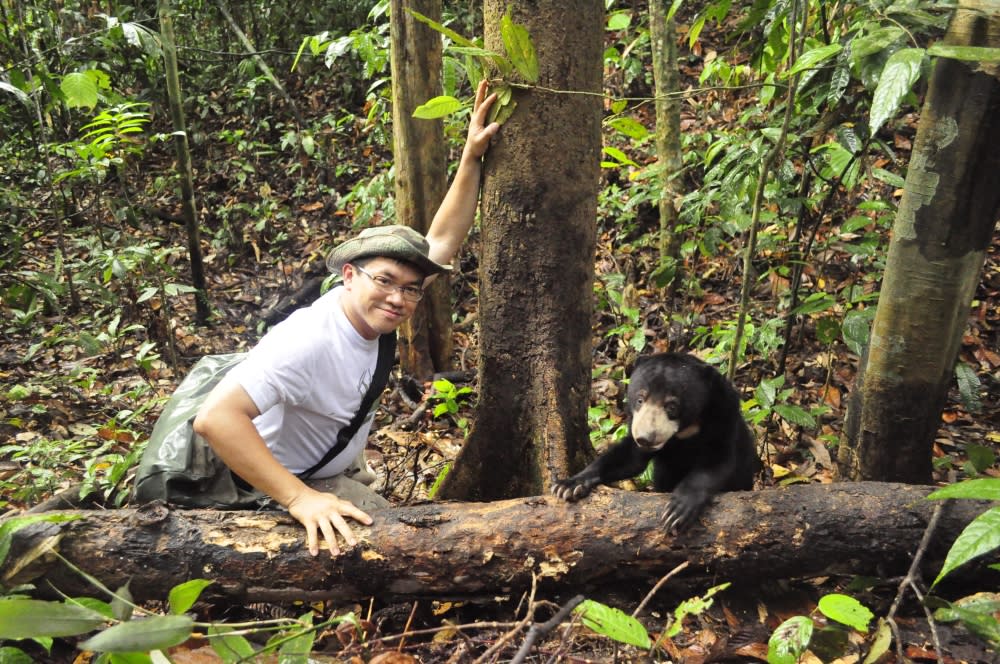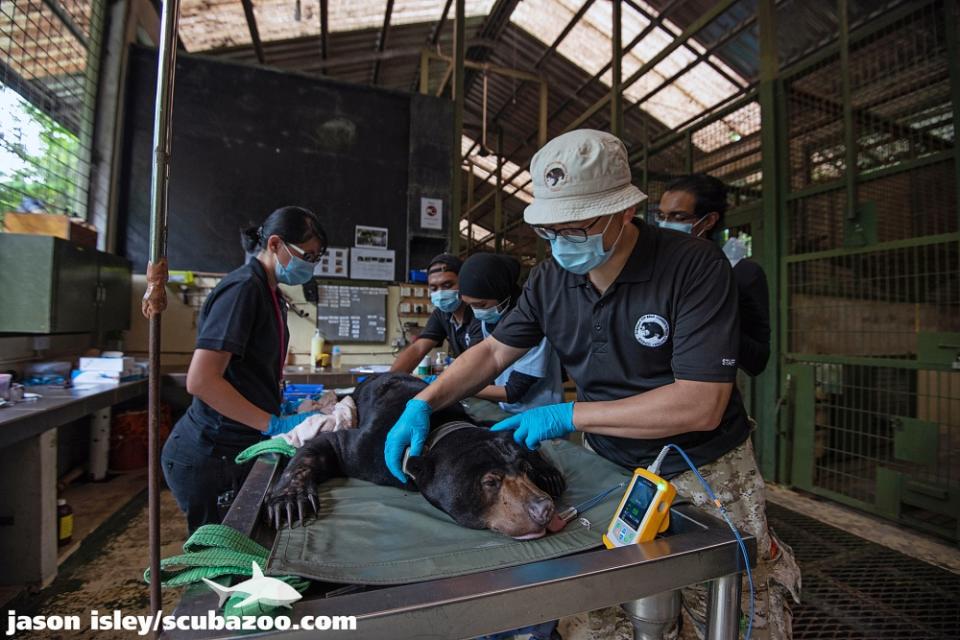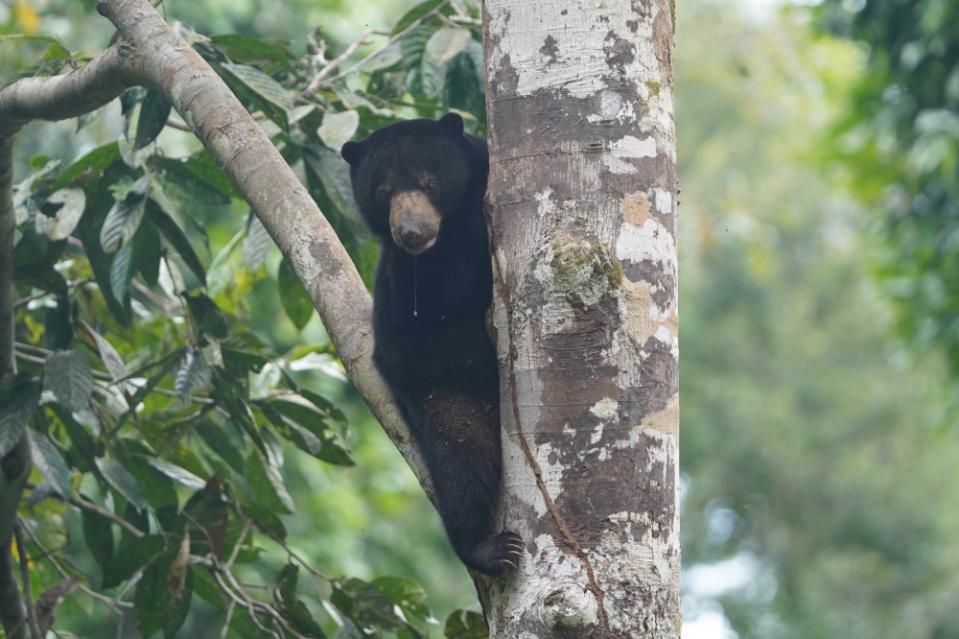He spent half his life protecting our sun bears: Meet legendary wildlife biologist Wong Siew Te (VIDEO)

KUALA LUMPUR, Sep 25 — After 25 years of studying sun bears, wildlife biologist and conservationist Wong Siew Te still can’t seem to get enough of them.
As the world’s foremost expert on sun bears and the first Malaysian to study them, 54-year-old Wong, better known as Wildlife Wong, finds everything about them special.
For starters, they’re the smallest bear species in the world and very arboreal, which means they spend a lot of time in trees.
“They play so many important roles as forest doctors, forest engineers and forest farmers,” said Wong, who founded the Sandakan-based Bornean Sun Bear Conservation Centre (BSCC), the world’s only sun bear rescue conservation centre, 15 years ago in 2008.
“They also plant trees through speed dispersal and provide food for other animals as there is always something left behind when they break apart termite and ant’s nests, some animals follow them around for this.”
Describing how it began with his first time studying wild sun bears in 1998 as ‘life-changing’ at the age of 29, Wong, born and raised in Bukit Mertajam, Seberang Perai, Penang, said the presence of sun bears benefits both plant and animal species in our forest.
“The forest without them will be a very different forest, that’s why they are so special, that’s why we need to keep our sun bears alive in our forest.”
His dedication and passion for sun bears is so awe-inspiring that you would wonder if he believes he might have been a sun bear in a past life.
“Never thought of it, doesn’t matter,” said Wong who describes himself as a scientist, first and a Buddhist who embraces teachings of other religions, second.
“What matters is this life. I need to contribute as much as possible. The important thing is to continue to do good things to help animals.”

Wong (in bucket hat) and his team fitting a radio collar on sun bear Natalie. — Picture courtesy of Wildlife Wong
To date, the BSBCC, which currently has 37 full-time staff, has rescued 69 bears.
All were orphaned after poachers captured them from the wild and killed their mothers.
Located in Sepilok-Kabili Forest Reserve, the centre rehabilitates sun bears in its large forest enclosure, the next best thing to its natural habitat. This is done by encouraging typical bear behaviour like tree-climbing, nest-building and foraging.
Staff from BSBCC’s bear care unit, one of four units, also walk sun bears that are less than a year old in the surrounding forest as part of their rehabilitation.
Some were successfully released into the wild but some were too traumatised to make it on their own, which is why the centre is a permanent home to 44 bears.
Wong considers all of them his children so he doesn’t have a favourite but says that he spends most of his time with the ones he raised from young.
One of them, Mary, was seriously malformed as a result of calcium deficiency and malnutrition when the Sabah Wildlife Department rescued her as a sickly three-month-old cub from poachers in 2012.

Wong walking Baby Mary in 2012. — Picture courtesy of Wildlife Wong
When Wong first saw her, he immediately noticed her big head didn’t match her body and soon found out why — she was fed fruit and rice but not milk.
“In humans, it’s called rickets. Her body is very short, she cannot climb trees, and she walks very, very slowly,” said Wong.
“It may sound sweet but it’s actually very sad because her mother was brutally killed and Mary probably witnessed it.”
Being kept by her mother’s killers only contributed to her post-traumatic stress disorder that aggravated her stunted development.
Today, Mary is 12 years old and although healthy, weighs only about 22 kilograms. As a fully grown adult female bear, she’s supposed to weigh about 35 kilograms.
Unlike Mary, who will never leave the BSBCC, Tenom, the 68th bear rescued at BSBCC, will be its first bear released into the wild under the recently launched Tabin sun bear project, which is a long-term field-based research project and rehabilitation work that is committed to conserving sun bears in its natural habitat.
The wildlife reserve of Tabin was chosen because of its huge size of 1,200 square kilometres of low-land dipterocarp forest, which is double the size of Singapore, but without human habitation.
The war against poaching
In addition to animal welfare, rehabilitation and research, the BSBCC also focuses on education and eco-tourism.
“In this part of the world, we have a lot of poor people and telling them not to do this or not to do that is not enough because they are desperate to put food on the table,” said Wong.
“We need to help, only with happy people do we have happy wildlife and one way to do this is through nature-based tourism which creates jobs and brings in foreign tourists.”
He added that three years ago during the Covid-19 pandemic, when people lost their jobs, they went back to the forest to poach again to put food on the table.
Sadly, sun bears are poached for consumption and before the pandemic, Chinese tourists would come to Kota Kinabalu and pay RM2,000 to eat bear paws.
“The kind of money they were willing to pay creates a market and once a market is created, there will be supply.”
The most prized body part is their gallbladder which stores bile, an ingredient used in traditional Asian medicine.
Their teeth are also used in tribal ceremonies and their claws are made into amulets believed to repel evil spirits.
Bear cubs are also captured and kept as pets.
“When I was in Taiwan back in the late 80s and early 90s, people could buy a sun bear cub in a pet shop for a few thousand ringgit,” said Wong, who did a diploma in veterinary science in Taiwan before doing his bachelor’s degree, master’s degree and PhD in wildlife biology at the University of Montana, US.
“You could buy a baby orangutan for RM10,000 and a gibbon for RM8,000, the animals mostly came from Borneo.”
Despite staying strong in the war against poaching, Wong admits he does suffer bouts of depression.
“But I meditate, I try to turn my anger into positive energy so that I can continue to work and speak for the ones that cannot speak for themselves and cannot vote who will be the next government.
“I have to do that, I have no choice, if I give up, then they have no hope at all.”
An animal-lover all his life, Wong and his Taiwanese wife have two daughters. He lives by a quote from world renowned primatologist Jane Goodall, whom he met in 2019, that goes: “If we understand, will we care. If we care, will we help. Only if we help, shall they be saved.”
Surviving the pandemic
After his biggest challenge in protecting sun bears from poaching and deforestation, getting funding to keep operations running is another constant battle.
Like other organisations which are heavily dependent on tourist revenue from ticketing and souvenirs, BSBCC suffered tremendous loss during the Covid-19 pandemic.
During its closure, despite no revenue, none of the staff were laid off, thanks to some support from the government’s Prihatin Rakyat Economic Stimulus Package and a savings of RM1 million.
Twenty per cent of BSBCC’s expenses goes towards buying bear food, which includes a wide variety of fruits like bananas, papayas, pineapples and sugar cane and vegetables like pumpkin, corn and sweet potato. Cooked chicken and dog food are also given.
“We used up our savings to survive 2020, which we were lucky to have, but we didn’t have another million for 2021,” said Wong.
To generate money, he made a plea on social media and asked people from around the world to donate by adopting a sun bear. He also started a virtual tour, charging RM40 to join.
Luckily, Sime Darby Foundation and Hasanah Foundation came to the rescue.
It wasn’t until early this year that visitors returned and income slowly recovered.
“These are the two big funders that stepped in to save us during the pandemic,” said Wong.
“Trying to find that kind of money to keep the centre running was extremely challenging, especially during the pandemic, but yes, Alhamdullilah, we did it.”

Romolina, the 59th bear rescued at BSBCC, panting to keep cool on a tree. — Picture courtesy of Wildlife Wong
Climate change caused by deforestation
Malaysia has already lost two rhinoceros species, the Javan rhino back in the 1930s, and the Sumatran rhino, which went extinct a few years ago. Malayan tigers in the wild officially number less than 150.
A big problem Malaysians have is that we don’t know how valuable and special our forest and wildlife are. Instead, we associate the forest with something negative and since young, told not to go into the forest because it’s dangerous or evil.
“But nobody teaches us to treat our forests as the valuable commodity they are. Nobody teaches us that it’s our forests that give us clean air, clean water and a stable climate.”
Clearing our forests to build oil palm estates, rubber plantations and golf courses is not greening the earth and not the answer.
“That kind of message is dangerous,” said Wong. “We are clearing our most diverse ecosystems, the most diverse forests in the world and replacing it with monoculture plantations with a lot of pesticide, insecticide, herbicide, fertiliser and non-endemic exotic species and we say it’s ok.”
It’s not ok to log our forests as long as we replant trees because our forests were planted by the animals and God which took 130 million years to grow.
We need to change our mentality right now, if not, global climate change is going to hit us hard.
Already, it’s hotter and drier because our forests are shrinking, affecting the rainfall generated from the forest as moisture has been diluted outside the non-forested side.
“Right now, we’re seeing our forests changing, our weather patterns changing, if we are still naïve about the importance of our forests, then we are doomed.”



